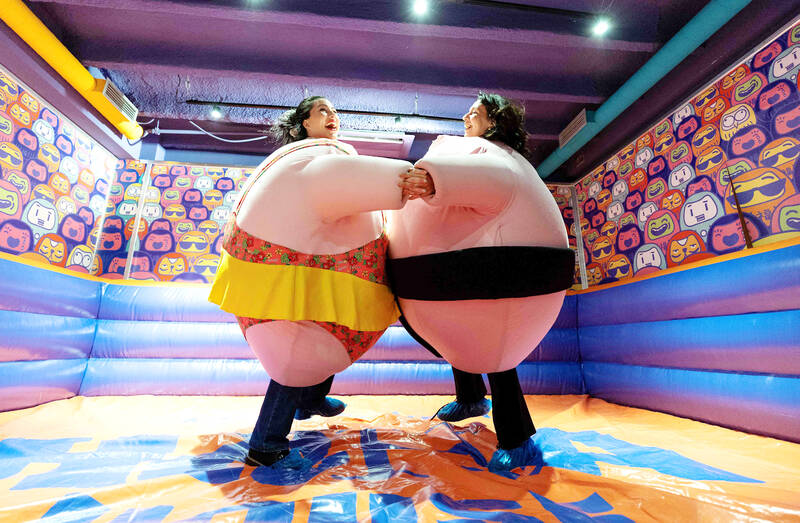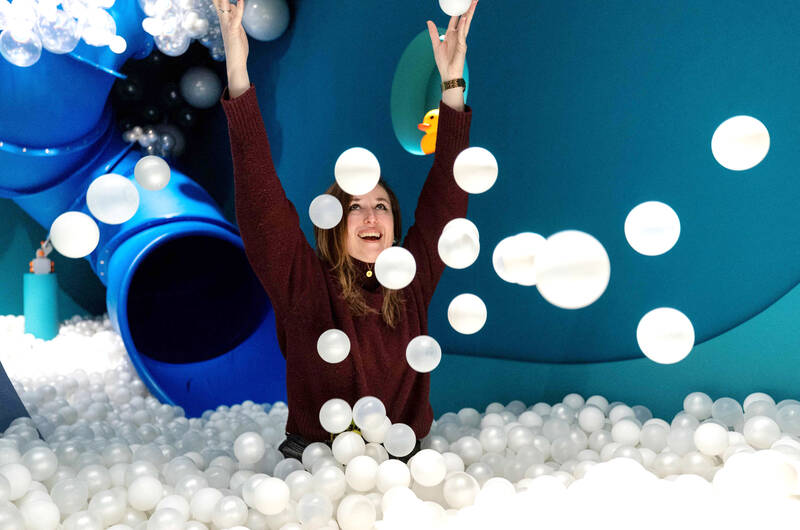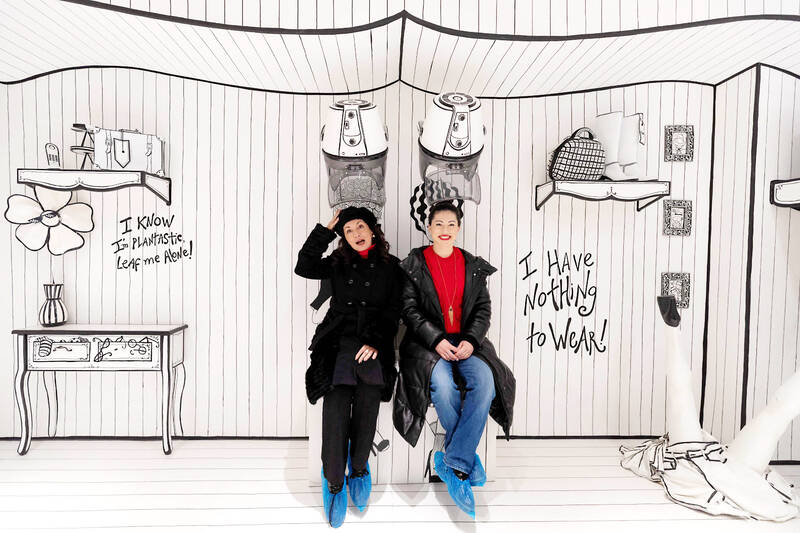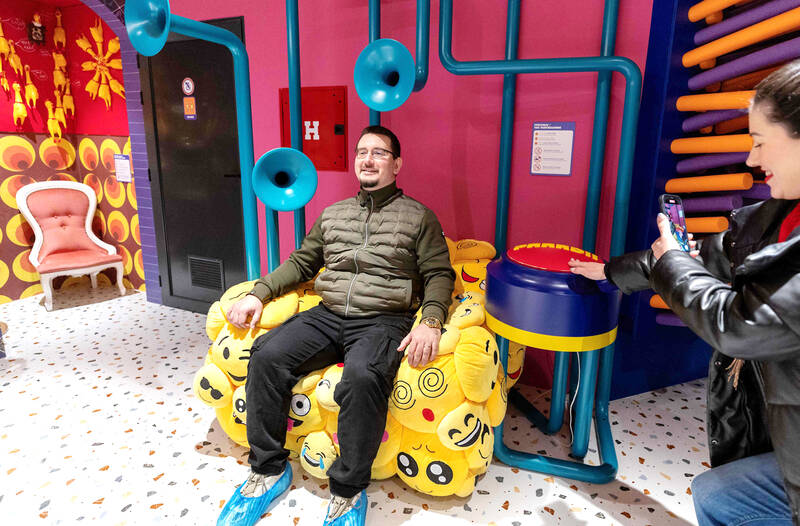A new museum of laughter is offering to put people through the spinner to wash away the negativity of modern life.
Visitors to the HaHaHouse in the Croatian capital Zagreb are blasted with a puff of white smoke once they step inside to blow away their worries before climbing into a “giant washing machine.”
The “centrifuge of life” then whips them away Willy Wonka-style down a twisting slide into a pool filled with little white balls where their journey to a happier place starts.

Photo: AFP
Its creator Andrea Golubic said she had the idea for the museum during the pandemic when many were feeling down, depressed and isolated.
“I realized that I had a mission — to heal people with laughter,” added the upbeat 43-year-old.
The idea “came straight from the heart,” Golubic said, “and on that very day I listed 78 exhibits... that’s how the HaHaHouse began.”

Photo: AFP
Golubic said it was her carefree seven-year-old self that inspired her — “a picture of me as a first-grader, with wide teeth and dying of laughter. I was constantly joking as a kid,” she said.
Visitors press a button to be “disinfected from negativity” as soon as they step inside the museum, which has eight interactive zones.
One has a rubber chicken choir cheerfully cackling out hits like ABBA’s Dancing Queen, there is a karaoke room with distorted voices and a “Sumo Arena” for wrestling in puffed up costumes.

Photo: AFP
There is also some serious history of humor from ancient to modern times told through theater, film and the Internet. The museum also explains humor styles, from word play, slapstick, toilet and dark humor to satire with the help of some choice one-liners.
“I’ve had so much plastic surgery, when I die they will donate my body to Tupperware,” is one of the featured zingers from US comedian Joan Rivers.
‘INNER CHILD’

Photo: AFP
Golubic said the HaHaHouse is drawing everyone from small children to the elderly, with grown-ups seeing it as a good excuse to play at being kids again themselves.
“All those who still feel a bit of childish joy and embrace their inner child, will recharge themselves,” she insisted.
Pensioner Bruno Dadic said he was “delighted” by his visit “as there is never enough humor in life.
“Laughter is a medicine for the soul,” he said.
Zagreb’s psychiatric hospital has voiced interest in organized visits and links are also being made with schools and retirement homes.
“The museum is great,” said Aleksandar Suka who celebrated his fifth birthday with a visit. Accompanied by his mother, the little boy said he loved lying on the “Bed of Nails” since they tickled him. Singer Zorica Bucic, from the coastal town of Split, said the museum was perfect for our times “when we are bombarded with so much bad news.
“Entering here is like entering childhood, being relieved of all problems. If you could come here more there would be no need to pay a psychologist,” she said.
Indeed, laughter is a defence mechanism which gives people strength to face their problems, psychologist Petar Kraljevic said, adding he loved the idea too.
“If a prescription for three hours of laughter per 24 hours could be written and followed that would certainly give positive results.”

This month the government ordered a one-year block of Xiaohongshu (小紅書) or Rednote, a Chinese social media platform with more than 3 million users in Taiwan. The government pointed to widespread fraud activity on the platform, along with cybersecurity failures. Officials said that they had reached out to the company and asked it to change. However, they received no response. The pro-China parties, the Chinese Nationalist Party (KMT) and Taiwan People’s Party (TPP), immediately swung into action, denouncing the ban as an attack on free speech. This “free speech” claim was then echoed by the People’s Republic of China (PRC),

Exceptions to the rule are sometimes revealing. For a brief few years, there was an emerging ideological split between the Democratic Progressive Party (DPP) and Chinese Nationalist Party (KMT) that appeared to be pushing the DPP in a direction that would be considered more liberal, and the KMT more conservative. In the previous column, “The KMT-DPP’s bureaucrat-led developmental state” (Dec. 11, page 12), we examined how Taiwan’s democratic system developed, and how both the two main parties largely accepted a similar consensus on how Taiwan should be run domestically and did not split along the left-right lines more familiar in

Many people in Taiwan first learned about universal basic income (UBI) — the idea that the government should provide regular, no-strings-attached payments to each citizen — in 2019. While seeking the Democratic nomination for the 2020 US presidential election, Andrew Yang, a politician of Taiwanese descent, said that, if elected, he’d institute a UBI of US$1,000 per month to “get the economic boot off of people’s throats, allowing them to lift their heads up, breathe, and get excited for the future.” His campaign petered out, but the concept of UBI hasn’t gone away. Throughout the industrialized world, there are fears that

Most heroes are remembered for the battles they fought. Taiwan’s Black Bat Squadron is remembered for flying into Chinese airspace 838 times between 1953 and 1967, and for the 148 men whose sacrifice bought the intelligence that kept Taiwan secure. Two-thirds of the squadron died carrying out missions most people wouldn’t learn about for another 40 years. The squadron lost 15 aircraft and 148 crew members over those 14 years, making it the deadliest unit in Taiwan’s military history by casualty rate. They flew at night, often at low altitudes, straight into some of the most heavily defended airspace in Asia.